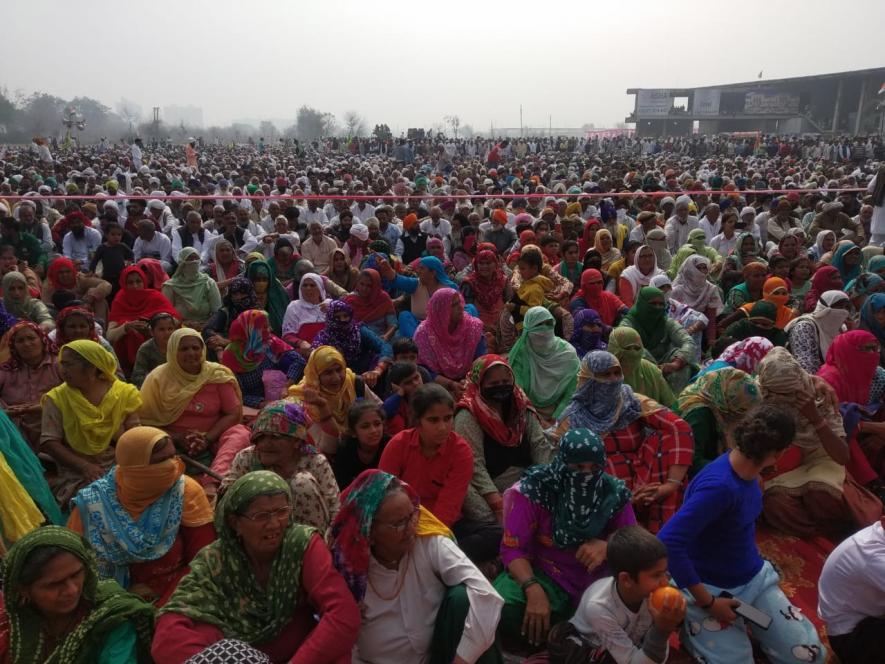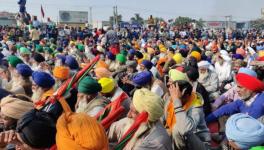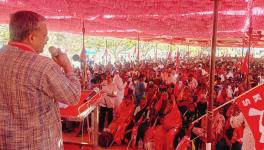Haryana: Underneath Mahapanchayats, a ‘Fertile Land’ for Bringing Progressive Social Change
On February 7, farmers flocked to a mega meeting held at Kitlana toll plaza on Charkhi-Dadri national highway near Bhiwani. Image Courtesy - Facebook
New Delhi: As the agitation against the three farm laws is metamorphosing into a mass movement in Haryana, the developments on the ground has prompted social and political leaders to view the entire episode as a harbinger of a possible progressive change in the state that is otherwise accused for harbouring regressive hierarchies.
Post the Republic Day controversy in the national capital when a wayward contingent of farmers had entered the Red Fort, leading many to fear about the ending of the farmers protests at Delhi borders, it were the khaps, the community-based groups prevalent in north Indian villages jumped into action to keep the struggle on. They ensured the continued pouring in of protesters at the border protest sites – Singhu, Tikri, Ghazipur – along with ration and daily essentials, and organised mobilisation drives back in the hinterlands.
Lying at the centre are the many mahapanchayats (large village council meetings) that are being organised especially in Haryana and in the western regions of Uttar Pradesh.
Inderjit Singh, vice president, All India Kisan Sabha – Haryana, explained why the khaps and the mahapanchayats organised by them are becoming the platform of lately to channelise the “accumulated anger” of the farmers against the “onslaught of the Modi government” that has “deepened the agrarian crisis.”
“We need to understand that an overwhelming majority of the peasantry is out of the fold of unions and as such at a moment when a mass movement is being build, the only social organisation in available to them, especially in the heartlands of Haryana, are the khaps and the panchayats,” he said.
Also see: Thousands Gather for Bhiwani-Dadri Mahapanchayat
Four such major gatherings have taken place in Haryana so far, which were thronged by not just farmers but by those belonging to other economic groups as well.
A kisan mahapanchayat, that was also attended by Bharatiya Kisan Union (BKU) - UP leader Rakesh Tikait, was organised in Kandela, a village in Jind district on February 3; a mahapanchayat was held at Khatkar toll plaza on the Jind-Patiala highway as well on the same day. Likewise, four days later on February 7, farmers flocked to the mega meeting at Kitlana toll plaza on Charkhi Dadri-Bhiwani national highway near Bhiwani and at Sunheda in the Mewat area of Haryana.
A farmers’ gathering was organised this week on Tuesday in Kurukshetra district as well, while another is scheduled to be held today, on Friday, in Bahadurgarh – a city not so far away from the Tikri border.
Irrespective of the geographical locations, the mahapanchayats drew huge turnouts. Somveer Sangwan, head of his community’s khap told NewsClick, “The many mahapanchayats organised till now have ensured turning the protests against the kaale kanoon into a mass movement. No matter, where or when a meeting is called, the crowd in these mahapanchayats are touching 20,000 to 30,000 easily.”
An MLA from Charkhi Dadri Assembly seat who had resigned as chairman of Haryana Livestock Board back in November in solidarity with the protesting farmers, Sangwan added that as many as “50,000” turned up on February 7 at the Kitlana toll plaza. “Haryana ki 36 biradri ka ab toh baccha-baccha iss andolan mein shamil ho gaya hai (Everyone, from children to adults from the 36 communities in Haryana are now participating in this movement),” he said.
Jagmati Sangwan, a Haryana-based women’s rights activist confirmed the same. “A sizeable number of women are participating in the mahapanchayats that are being held on farmers’ issues. Similarly, the number of women who are joining the protests at Delhi borders have also increased in the recent past,” she told NewsClick.
Also see: Farm Laws: The Resistance Grows
On being asked about how the participation of women on such a large scale has become possible, given that the patriarchal setup has been a dominating feature in the state – reinforced further by the khaps, she said, “It is because in Haryana, the women are very much associated economically with farming and hence there is a feeling that women can’t be left behind in expressing their anger.”

This is the very reason now, according to her, that the two groups – women and Khaps – that have traditionally remained at loggerheads with each other over more social freedom to the former are coming together to share a similar platform.
“The farmers protests are creating a fertile land which will allow for the social and cultural relations in Haryana’s society to take a progressive turn in the coming days,” she said, illustrating it with examples of the changing social behaviours at the protest sites women are “exercising their agency with dignity.”
Just as with gender divisions, the economic divisions are also mending. Harpal Singh, organising secretary, Bharatiya Kisan Union (Chaduni), said, “The mahapanchayats in Haryana are not just attended by farmers but landless workers and those with salaried jobs as well. They all feel that there livelihood – in some way or the other – will get affected by the farm laws.”
It is due to this participation from different sections only, Singh added, that the mobilisation drives in Haryana villages are now more focused on the negative affects of the farm laws on the consumers, rather than just cultivators.
Asked about the composition of the congregation at the mahapanchayats, Inderjit Singh viewed that the “crowds that are being seen only after decades” are not “exclusive” to any particular community, and thus are enabling the resolution of contradictions between different groups – though “only temporarily.”
He added, “If the protest sustains then definitely a change will be observed in Haryana’s social and political sphere. That’s how mass movements operate – they bring together different sections and help in creating something new out of the process.”
Also read: Haryana: After Mahapanchayats, State Leaders to Feel Heat over Farm Laws
Get the latest reports & analysis with people's perspective on Protests, movements & deep analytical videos, discussions of the current affairs in your Telegram app. Subscribe to NewsClick's Telegram channel & get Real-Time updates on stories, as they get published on our website.























